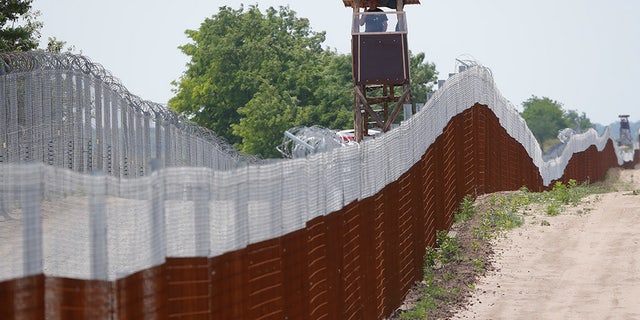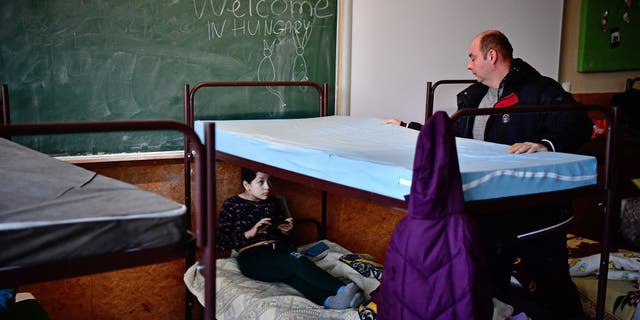UNITED NATIONS, New York – Hungary continues to chart a path that officials believe best represents the “will of the people,” even as it puts the national government at odds with a liberal European Union.
“We have been a Christian state for more than 1,000 years since our first saint, King Stephen, has offered the country to the hands of Mary the Virgin, and we take it seriously,” Hungarian Foreign Minister Péter Szijjártó told Fox News Digital in an exclusive interview during his visit to the United Nations in New York.
“We stick to our Christian heritage. We stick to our Christian roots,” Szijjártó continued. “We implement a Christian Democratic political strategy.”
Hungary has increasingly found itself at odds with the European Union following aggressive moves by the European Commission to cut some 6.3 billion euros in funding to a number of Hungarian institutions – most recently voting to cut funding that will impact universities and students studying abroad in the Erasmus program.
CROATIAN PRESIDENT BLASTS EU PENALTIES AGAINST HUNGARY
Hungary has even threatened to sue the EU over the decision, but the EU has argued that Hungary’s education system does not adequately protect academic freedom from political interference.
“When you ask the liberal mainstream in Brussels, in Washington, what they think democracy is, then they think that a political structure can be considered as a Democratic one if it is the liberals who rule,” Szijjártó said. “That’s why they always speak about liberal democracy, but our position is a democracy is a democracy. You don’t have to use other words.”
Hungarian Foreign Minister Péter Szijjártó spoke with Fox News Digital in the East Lounge at the United Nations Headquarters in New York City.
(Peter Aitken/Fox News Digital)
“We believe a democracy means that you as a government, as a political structure, do your best to fulfill the will of the people,” he added.
Szijjártó accused the European Commission of suffering from “Hungarophobia” and continuing to add issues even as Hungary works to implement the previously agreed upon targets.
TALIBAN WARNS UNIVERSITIES NOT TO ALLOW AFGHAN WOMEN AND GIRLS TO TAKE ENTRY EXAMS
He called the action against universities “insane,” claiming that other European nations have similar cases but do not face the same kind of “double standard” for it, saying, “What is acceptable in one country, it’s considered to be unacceptable in the other.”
“It’s really unfair that once you have an agreement about a closed list of issues, which are being expected, you raise the question, is it enough?” Szijjártó argued. “Then we have done it, and then the European Commission came forward with new request[s].”

Musicians and dancers perform on stage in front of the light-painted churches in Veszprem, Hungary, during the grand opening on Jan. 21, 2023, as the town and its region became the 2023 European Capital of Culture along with Elefsina, Greece, and Timisoara, Romania.
(Attila Kisbenedek / AFP via Getty Images)
Two significant issues raised by the commission focused on Hungary’s treatment of LGBTQ+ issues and on the country’s asylum system.
Specifically, European leaders raised concerns over Hungary’s law that limits schools from teaching about homosexuality and transgender issues and accused the country’s government of failing to comply with the EU Charter of Fundamental Rights.
Szijjártó said the Hungarian government doesn’t care “who people fall in love with … who they share their private life with” but that the government believes that “education of children regarding sexual orientation is an exclusive right of the parents.”
“When it comes to children, we will always protect them,” Szijjártó said. “So, that’s why we have forbidden the NGOs of LGBT organizations, whatever, to go to our schools, to our kindergartens, and without any kind of control to our kids. You know, it’s unacceptable.”

Hungarian soldiers patrol the Hungarian-Serbian border near the village of Tompa, Hungary, June 14, 2017.
(Reuters / Laszlo Balogh)
“We are their parents,” he added. “We know them the best. I’m pretty sure that there’s no LGBT NGO in the world which would know my kids better than I do.”
And while Szijjártó noted that it would be “very inappropriate” to give President Joe Biden any advice on border issues, he noted that Hungary’s experience has shown that “only with human resources, namely, only with police, border guards, army, it was impossible to protect the border.”
IRAN MILITARY FACILITY ROCKED BY EXPLOSION THAT OFFICIALS SAY WAS ‘UNSUCCESSFUL’ DRONE ATTACK
Hungary tackled the issue by building a border barrier in 2015, which aimed to limit and control the flow of migrants from Afghanistan, Iraq and Sudan, as well as a surge of migrants from Syria that caused division across Europe.
“We will never give up the national right of ours to make a decision on our own whom we allow to enter our territory and whom we do not allow,” Szijjártó explained.

A girl who fled Ukraine with relatives sits on a bunk bed in a classroom converted into an emergency shelter at a school in Zahony, northeastern Hungary, on the border with Ukraine, March 4, 2022.
(Marton Monus/picture alliance via Getty Images)
“So, there is no external force who would be entitled to take over this capacity of the right of decision from ourselves,” he said, noting that when former President Donald Trump was in office, Hungary and the U.S. were aligned in their view on migration policy.
The border has taken renewed focus as the conflict between Russia and Ukraine nears the one-year mark: Hungary has accepted some 1 million refugees from Ukraine but has stopped around 260,000 illegal migrants from other countries from gaining entry.
CLIMATE CHANGE PROTESTERS IN THE HAGUE BLOCK HIGHWAY, GET DETAINED AND HAULED AWAY BY BUS
“They have crossed through a series of safe countries,” Szijjártó said. “They have no right to come in. There is no reason for any person to violate the border between two peaceful countries.”
Hungary remains concerned about Ukraine, noting that the impacts of the conflict are “severe and immediate” for his country due to the “refugees, skyrocketing inflation, skyrocketing energy prices, skyrocketing food prices.”
Szijjártó noted that for America, the conflict might appear “from an ocean away,” but the consequences are “really serious back at home,” which is why Hungary is advocating for peace talks and a change to “current war rhetoric. He argued that peace talks are in the interest of the Ukrainian people as well because “they are suffering.”
CLICK HERE TO GET THE FOX NEWS APP
“The longer this war takes, the more it’s going to be prolonged,” he said. “The more it might be escalated, the more people will suffer.”
Reuters contributed to this report.